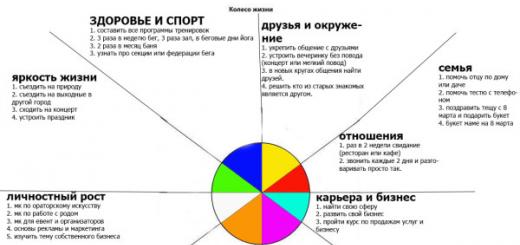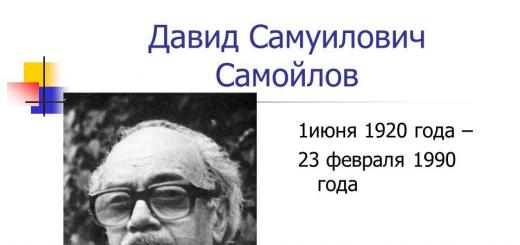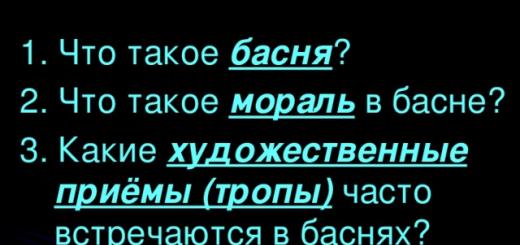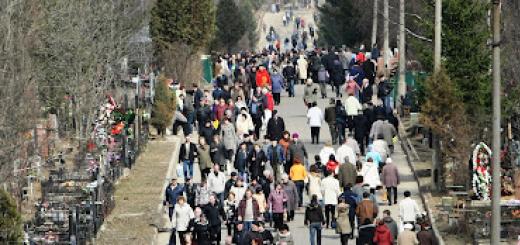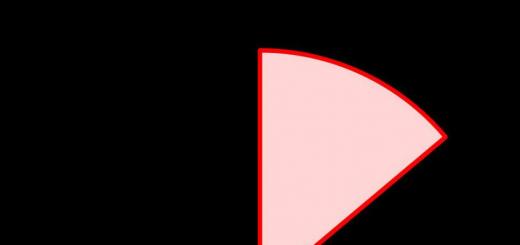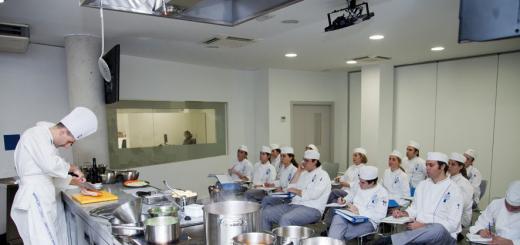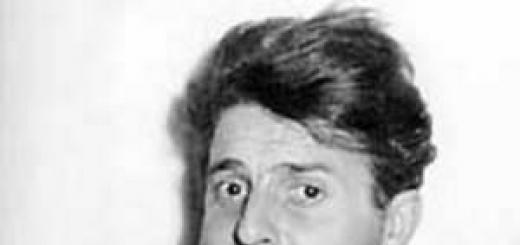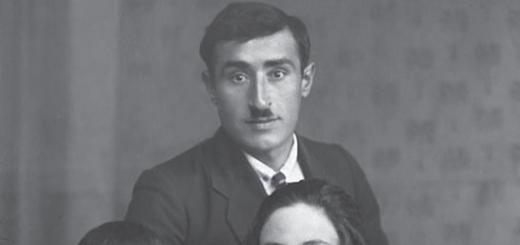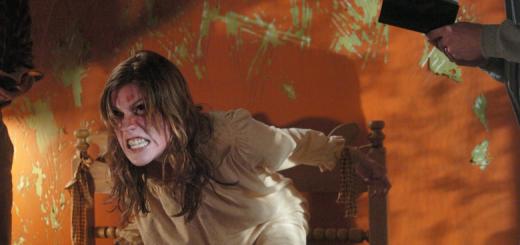“Everyone knows that our great fabulist I. A. Krylov became interested in the fable of the French poet La Fontaine “The Cicada and the Ant.” It must be said that “Vanyusha Lafontaine” himself, in turn, borrowed the plot of this fable from the great Greek Aesop; from Aesop to La Fontaine, instead of the usual European grasshopper (in French, “gryon”), another melodious and loud-voiced insect, especially characteristic of the Mediterranean, made its way into poetry - the cicada (la cigale, “la cigale” in French). Having decided to translate, or, more precisely, translate this fable into Russian, Krylov encountered some difficulties.
Lafontaine was French. He spoke and thought in French. For him, “ant” was “la fourmie”; the word is feminine in France. The word “la cigale” also belongs to the feminine gender, meaning the southern incessant singing cicada. From time immemorial, the French, like us, have considered the ant (or “ant”) a model of hard work and homeliness. Therefore, La Fontaine very easily and gracefully created the image of two female gossips chatting at the threshold of an ant’s home: the economic “ant” scolds the frivolous singing cicada.
To more accurately convey all this in Russian, Krylov would have to first of all make “ant” “ant,” but we don’t have such a word. I had to leave him as an ant, and in the new fable the main thing changed: one of the talkers turned out to be a “strong man”, and not a “gossip”. But that was not all.
The word “cicada” now exists in our literary language, but it penetrated into it only in the 19th century, when Russia firmly stood on the shores of the Black Sea, in the Crimea and in the Caucasus. Before that, our people had almost never encountered this peculiar insect and had not chosen a name for it. The word “cicada” is unknown in popular speech, but I. A. Krylov was a great master of purely folk poetic works, understandable and accessible to every commoner of that time. Of course, he could not make some unknown foreigner “cicada” his second interlocutor.
Then, instead of translating, Krylov wrote a completely different, already his own, fable. Everything in it is not like La Fontaine: The conversation takes place not between two gossips, but between a neighbor and a neighbor, between a “hoarding” ant and a carefree “jumping” dragonfly.
“Don’t leave me, dear godfather!” - she squeaks.
“Gossip, this is strange to me!” - he answers.
It is clear why Krylov forced the dragonfly to talk with the ant: he did not at all want two “men” - the “ant” and the “grasshopper” - to talk. As a result, a strange hybrid of two different insects appeared in the fable. This creature is called a “dragonfly”, and “jumps” and “sings” “in soft ants,” that is, in the grass, clearly like a grasshopper. Dragonflies are insects that get into the grass only due to some unfortunate accident; These are flying and airy, and also completely voiceless, dumb beauties. It is clear that when he wrote “dragonfly,” Krylov was thinking about the distant relative of the southern cicada, our grasshopper.”
In 1808, Ivan Krylov’s fable “The Dragonfly and the Ant” was published. However, Krylov was not the creator of this plot; he translated into Russian the fable “The Cicada and the Ant” by Jean de La Fontaine (1621-1695), who, in turn, borrowed the plot from the Greek fabulist of the 6th century BC. Aesop.
Aesop's prose fable "The Grasshopper and the Ant" looks like this:
In winter, the ant pulled out its supplies, which it had accumulated in the summer, from a hidden place for drying. A starving grasshopper begged him to give him food to survive. The ant asked him: “What did you do this summer?” The grasshopper replied: “I sang without resting.” The ant laughed and, putting away the supplies, said: “Dance in winter, if you sang in summer.”
Lafontaine changed this plot. Aesop's male grasshopper has turned into La Fontaine's female cicada. Since the word “ant” (la Fourmi) in French is also feminine, the plot is not about two men, like Aesop, but about two women.
Here is a translation of La Fontaine's fable "La Cigale et la Fourmi" / The Cicada and the Ant from N. Tabatchikova:
Summer whole Cicada
I was happy to sing every day.
But the summer is leaving red,
And there are no supplies for the winter.
She didn't go hungry
She ran to Ant,
If possible, borrow food and drink from a neighbor.
“As soon as summer comes to us again,
I’m ready to return everything in full, -
Cicada promises her. -
I’ll give my word if necessary.”
Ants are extremely rare
He lends money, that’s the problem.
“What did you do in the summer?” -
She tells her neighbor.
“Day and night, don’t blame me,
I sang songs to everyone who was nearby.”
“If so, I’m very happy!
Now dance!”
As we see, the Cicada does not just ask the Ant for food, she asks for food on credit. However, Ant is devoid of usurious inclinations and refuses her neighbor, dooming her to starvation. The fact that Lafontaine predicts the death of the cicada between the lines is clear from the fact that the cicada was chosen as the main character. In Plato’s dialogue “Phaedrus” the following legend is told about cicadas: “Cicadas were once people, even before the birth of the Muses. And when the Muses were born and singing appeared, some of the people of that time became so delighted with this pleasure that among the songs they forgot about food and drink and died in self-forgetfulness. From them later came the breed of cicadas: they received such a gift from the Muses that, having been born, they do not need food, but immediately, without food or drink, they begin to sing until they die."
.jpg)
.jpg)

Ivan Krylov, having decided to translate La Fontaine’s fable into Russian, was faced with the fact that the cicada was little known in Russia at that time and Krylov decided to replace it with another female insect - the dragonfly. However, at that time two insects were called dragonflies - the dragonfly itself and the grasshopper. That’s why Krylov’s “dragonfly” jumps and sings like a grasshopper.
Jumping Dragonfly
The red summer sang;
I didn’t have time to look back,
How winter rolls into your eyes.
The pure field has died;
There are no more bright days,
Like under every leaf
Both the table and the house were ready.
Everything has passed: with the cold winter
Need, hunger comes;
The dragonfly no longer sings:
And who cares?
Sing on a hungry stomach!
Angry melancholy,
She crawls towards the Ant:
“Don’t leave me, dear godfather!
Let me gather my strength
And only until spring days
Feed and warm! -
“Gossip, this is strange to me:
Did you work during the summer?” -
Ant tells her.
“Was it before that, my dear?
In our soft ants
Songs, playfulness every hour,
So much so that my head was turned.” -
“Oh, so you...” - “I’m without a soul
I sang all summer.” -
“Did you sing everything? this business:
So come and dance!”
Krylov's ant is much more cruel than Aesop's or La Fontaine's ants. In other stories, the Grasshopper and the Cicada ask only for food, i.e. it is implied that they still have warm shelter for the winter. From Krylov, the Dragonfly asks the Ant not just for food, but also for warm shelter. The Ant, refusing the Dragonfly, dooms it to death not only from hunger, but also from cold. This refusal looks even more cruel, considering that a man refuses a woman (Aesop and La Fontaine communicate with same-sex creatures: Aesop has men, and La Fontaine has women).
Dragonfly and ant. Artist E. Rachev

Dragonfly and ant. Artist T. Vasilyeva

.jpg)
Dragonfly and ant. Artist S. Yarovoy

Dragonfly and ant. Artist O. Voronova

Dragonfly and ant. Artist Irina Petelina
Dragonfly and ant. Artist I. Semenov

Dragonfly and ant. Artist Yana Kovaleva

Dragonfly and ant. Artist Andrey Kustov
.jpg)
.jpg)
Krylov's fable was filmed twice. The first time this happened was in 1913. Moreover, instead of a dragonfly, for the reasons already mentioned, Vladislav Starevich’s cartoon features a blacksmith.
The second time Krylov’s fable was filmed in 1961 by director Nikolai Fedorov.
Jumping Dragonfly
The red summer sang;
I didn’t have time to look back,
How winter rolls into your eyes.
The pure field has died;
There are no more bright days,
Like under every leaf
Both the table and the house were ready.
It's all gone: with the cold winter
Need, hunger comes;
The dragonfly no longer sings:
And who cares?
Sing on a hungry stomach!
Angry melancholy,
She crawls towards the Ant:
“Don’t leave me, dear godfather!
Let me gather my strength
And only until spring days
Feed and warm!” -
“Gossip, this is strange to me:
Did you work in the summer?” -
Ant tells her.
“Was it before that, my dear?
In our soft ants -
Songs, playfulness every hour,
So it turned my head."
“Oh, so you...” - “I’m without a soul
I sang all summer.” -
“Have you been singing everything? This business:
So go and dance!”
Moral of the fable Dragonfly and Ant
“Have you been singing everything? This business:
So go and dance!”
In order not to freeze in winter, you need to work in the summer, and not constantly rest.
The Ant symbolizes work and hard work, and the Dragonfly symbolizes laziness and frivolity.
“Jumping Dragonfly
The red summer sang..."
(“Dragonfly and Ant”,
I.A. Krylov)
S T R E C O Z A I M U R A V E Y
(TWO HUNDRED YEARS LATER...)
"Jumping Dragonfly"
The red summer sang;
I didn’t have time to look back,
How winter rolls into your eyes.”
Somehow he looks - under the leaf -
An old acorn is someone's Home.
On the threshold - Ant:
(He was, like, her godfather)
“Did you work during the summer?”
It started. - “This is strange!” -
Dragonfly answers, -
“I sang! Well, that’s what he said!”
“And now my godfather..?”, -
“I’m in the casino at night!
One of the Zhukovs is holding it.
Today there’s a prize draw.”
And she rushed off, raising dust,
Having hired three locusts.
The ant swore.
I picked up the shovel again...
“It’s all gone: with the cold winter
Need, hunger is coming”;
The ant is still waiting for the bitch,
To drive away! Here... he hears a noise -
Runs out! - “Hello, godfather!” -
Dragonfly waves to him.
The eyes sparkle!
“You...sang everything...this...thing,” -
I just managed to babble...
“Sorry, I’m in a hurry again!
Reception of wine cellars
And a buffet! Well, be healthy!
Our hero is sour... Dejected
Angry with longing... Moonshine
Whispers of grief without a snack,
In his cellar... “In Russian.”
“The pure field has died;
There are no more bright days”;
The ant neither drinks nor eats -
In my thoughts I carry my cross:
“You’ll crawl... “Until the spring days
Feed and warm, -
Will you say..." Just... what a miracle!
He sees a Dragonfly! Where?!
Nearby...Well, well! Himself, formidable -
Of the coolest Beetles - Dung!
Both are wearing bast boots,
In expensive mouse fur coats.
“So... come on... dance...”, -
He's hopeful! - “From the heart!
In our soft ants
Playfulness! Ball! Just now.
Oh, how lovely this is!”
His jaw dropped.
“Well, bye!”, “Wait... a little...”,
“Well, what else, poor thing?” -
“Have you met Krylov?” -
“What the hell?” - “Yes... Master of words...
In general, Grandfather is like that...
Was! He wrote about you and me...”
“I haven’t read it... Well, I wanted to
Are you from him? He sat down.
With an exhalation - the last groan:
“Tell... What...
HE'S A BATTLE! ! !
A. Termenzhi
February 2004
Reviews
Everything has changed in this world.
The dragonfly lives in an apartment,
Yes, such that Ant
And I never dreamed of it. "I love you" -
Ant wants to say.
Yes, it’s too late: I can’t see -
The dragonflies are gone.
That's it, old neighbor!
Selyavi!
))))))))))))))))))))))))))))))
The daily audience of the portal Stikhi.ru is about 200 thousand visitors, who in total view more than two million pages according to the traffic counter, which is located to the right of this text. Each column contains two numbers: the number of views and the number of visitors.
The fable “The Dragonfly and the Ant” by Krylov will tell children how the lazy Dragonfly was rejected by the Ant in an attempt to take advantage of the fruits of his labor.
Read the text of the fable:
Jumping Dragonfly
The red summer sang,
I didn’t have time to look back,
How winter rolls into your eyes.
The pure field has died,
There are no more bright days,
Like under every leaf
Both the table and the house were ready.
Everything has passed: with the cold winter
Need, hunger is coming,
The dragonfly no longer sings,
And who cares?
Sing on a hungry stomach!
Angry melancholy,
She crawls towards the Ant:
Don't leave me, dear godfather!
Let me gather my strength
And only until spring days
Feed and warm!
Gossip, this is strange to me:
Did you work during the summer?
Ant tells her.
Was it before that, my dear?
In our soft ants -
Songs, playfulness every hour,
So much so that it turned my head.
Oh, so you...
I sang all summer without a soul.
Did you sing everything? This business:
So come and dance!
Moral of the fable: The Dragonfly and the Ant:
The moral of the story is that a lazy person dooms himself to death. And you shouldn’t expect that someone who has worked hard for a long time will share the results of his work with a slacker. It often turns out that a person leads an idle life, squanders all his property, and after that turns to, for example, relatives for help. Should they help him? Of course not. Just as the Ant advises the Dragonfly to go dancing, you can directly show such hangers-on their place.

